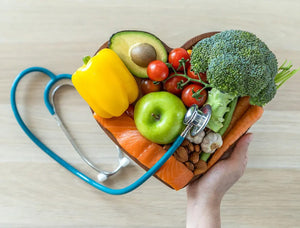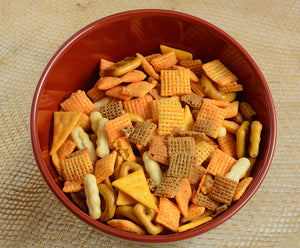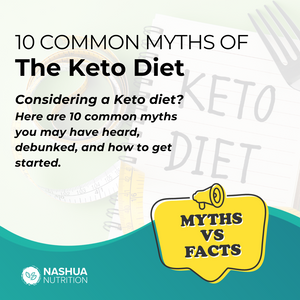National Nutrition Month: Plan to Better Health

Let’s be honest, shall we? We all know we could eat better if we had the time and the motivation. But time is lacking, and it’s hard to get motivated when you’ve made big changes before and experienced less than stellar results. If you’re tired of the vicious yo-yo cycle, you need something more realistic: small, attainable goals that build on each other to produce big results.
In honor of National Nutrition Month, we’ve rounded up our easiest, most effective tips to cut calories, manage cravings, and improve nutritional quality. Because after all, weight loss isn’t just about losing weight – it’s also about improving the nutritional quality of our diets. Try adding one challenge a week. By the end of two months, you’ll have reduced hundreds of calories from your diet and be on the way to a healthier, slimmer you. It won’t be fast weight loss, but stick with it! Yo-yo be gone!
- Look at your beverages! Don’t just assume a beverage is healthy because it’s not a soda. Teas, vitamin water beverages, energy drinks, fruit and vegetable juices, and coffee drinks can have hundreds of calories. Committing to only drinking water or other zero-calorie beverages could help your weight loss process.
- Read food labels. It will increase your awareness of portion size and calorie content.
- Consider your energy needs.The average, moderately active adult needs 10-12 calories per 1lb of goal weight. There are many resources available, like calorieking.com, for that provide nutritional information. Calories matter!
- Measure, measure, measure! Stop eyeballing and start measuring your food and ingredients. Commit to measuring portion sizes for one week, minimum. A few extra calories can make a big difference over the course of weeks and months.
- Learn to manage hunger by increasing your vegetable consumption. Non-starchy vegetables are so low in calories that you can eat a lot of them (aiding satiety) without adding a ton of unnecessary calories to your daily intake. Eat up!
- Pay attention to added sugar. Did you know that nearly 80% of foods in the supermarket have added sugar? Adults should consume no more than 6-9 teaspoons of added sugar every day. And yet, the average American consumes 41 teaspoons! Yikes! Sugar can hide in products that don’t taste sweet. Things like salad dressing and marinara sauce are common culprits.
- Ask yourself if you really need a snack. Often, boredom or other emotions can cause us to eat when we aren’t even hungry. Find a distraction instead. The best distraction removes you from “temptation areas” like the kitchen or house. Go for a walk or run an errand.
- Know how to indulge moderately. It’s ok to include your favorite treats as part of your daily diet, just make sure that you follow the suggested serving size. Moderate indulgence means knowing how much to have (remember your daily calorie limits from #3), and enjoying it as a part of a healthy diet.
- Nashua Nutrition Admin









